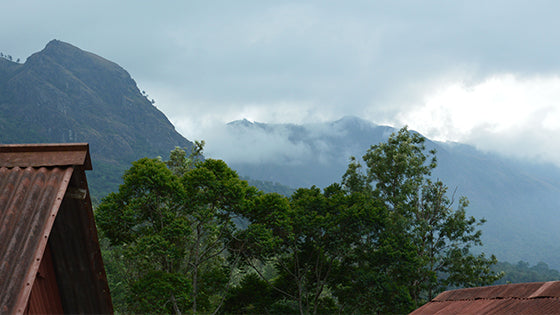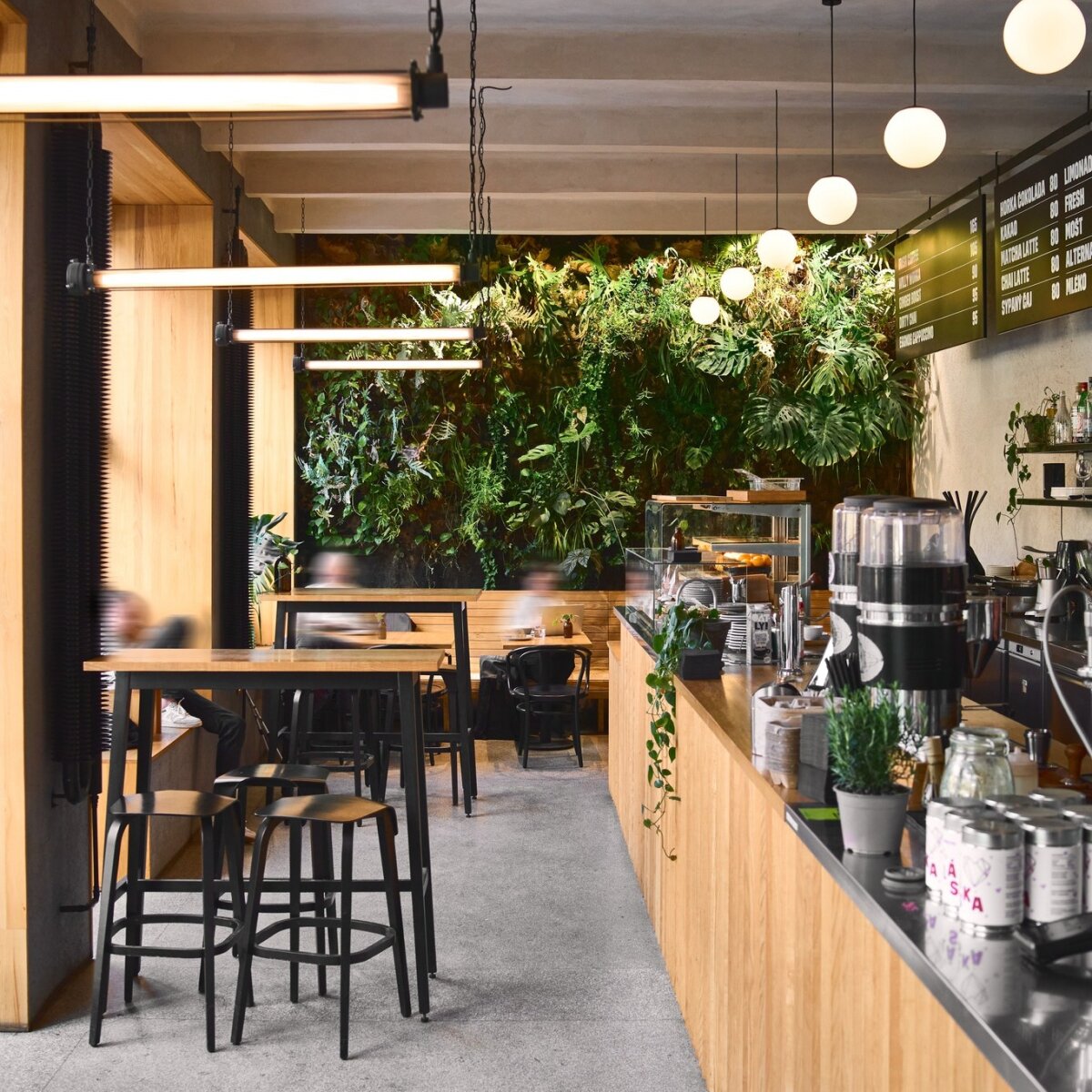A little talk about a biodynamic farm, growing an amazing selection of coffee.
Balmaadi Estate is located near the town of Gudalur, in the Nilgiris Mountains (translated as "Blue Mountains" of the Tamil language). The mountains seem blue due to the constant haze that envelops them most of the day.

The farm is located in the O'Valley Valley, on the border of Kerala, Tamil Nadu and Karnataka, but is under the administration of Tamil Nadu. The boundaries are constantly changing as officials paint it on maps. Many other farms in the area have clearly non-Indian names, but judge for yourself - Suffolk, Leicester, Lauriston, etc. The names thus refer to the British presence.
The farm was founded around 1840 by the Scottish adventurer Ouchterley. Today it is owned by one family, led by Mrs. Unnamalai Thiagarajan. The origin of the plantation had clear rules - first all the trees and shrubs were eradicated, until nothing was left on the site. Then roads were built and trees were planted to provide shade. Only when the trees grew could coffee bushes and other crops be planted.
Balmaadi is the highest active farm in the area, producing high quality coffee and tea for more than 170 years. It covers an area of about 420 acres at an altitude of 1300 to 1800 m above sea level. Kent, S9 and S795 and Cattimore coffee are grown here. The last mentioned variety does not bear fruit yet, these are recently planted coffee trees. In addition to coffee, spices are grown here - cardamom, stevia, and also tea - shrubs from Assam. Everything grows in the shade of mature trees.
The farm is quite difficult to access, it is about 8 km from the town of Gudalur by jeep or on foot. The roads are winding and very broken and it is necessary to overcome a large elevation. But it is thanks to this altitude that the farm produces such high-quality coffee and tea. There is another homestead in the neighborhood, but it has been abandoned for many years. The jungle is already beginning over the farm. In the center of the farm we find an office and a warehouse, behind them there is a tea plantation. Many exotic plants can be found on the slopes around it. Aloe vera grows here. They want to use this plant here for spraying against molds and fungi that attack coffee trees and thus replace spraying bordeaux with them, which is a mixture of blue rock and lime. Aloe vera spraying is more in line with the principles of organic farming. There is also a small stevia plantation, not large in area. Stevia is in high demand, so they plan to increase production here. This plant, although three times sweeter than sugar, has no calories. Not far from the bungalow and office, they grow cardamom, the second most important crop on the homestead after coffee. Many fig trees can be found on the plantations. They are not grown for the production of figs, but for their shade, which they provide to coffee trees. Orange figs can be seen on their trunk. The owner is trying to place the original Shola trees on the plantation. The return of these trees is supported by the government - seedlings are provided free of charge. It is with the trees grown to shade the coffee trees that there is a big problem. Young trees are a delicacy for elephants, monkeys and deer. All seedlings must be well protected. They use up to 2 meters high bars of wire into concrete, placed around a young tree. Nothing is 100%, so they are constantly repairing bars and planting trees. The only way to prevent the destruction of trees is to enclose the entire homestead with an electric solar fence. So far, only the most necessary farm center with residential and other buildings is fenced off. It used to happen that after a night trip of elephants, the trigger remained in the form of demolished windows and doors, including collapsed walls.
The homestead is divided into 3 divisions - Bungalow division, Western division and Wallwood division. They are separated by a road or a stream. Many streams flow through the farm, we are in the mountains and the springs are located somewhere below their peaks. From here water is supplied for irrigation, it is also used as drinking and utility water. Many dangerous animals live on the peaks, so it is not recommended to climb up. There used to be a village from Gudalur to this village, but today everyone prefers to take a bus. At night and during the dry season, the animals move to the farm. The fauna is diverse, elephants, panthers, mountain cows, roe deer and many birds live here. In the morning and evening it is a wonderful concert of thousands of bird's throats.
You live on a farm like 100 years ago, you go to the city only when absolutely necessary. Everything one needs is here. The illusion is disturbed only by constantly ringing mobile phones, Indians are crazy about mobile phones - perhaps everyone has it, as well as satellite TV on the half-ruined roof of the house. Staff work from 07:30 in the morning until 16:30 with a one-hour lunch break. They have a fixed salary, but if they collect more than the limit when collecting crops, they receive rewards. The owner takes good care of her employees, she has 50. All of them receive a salary, food and some even housing. Some of the employees live elsewhere, but most of them live directly on the farm. They have savings and receive their 13th salary, 15 days paid leave and sick leave. There are up to 100 people on the farm when the harvest is in full swing. There used to be a school and a hospital here, today everything is available at a higher level in nearby Gudalur. Thanks to a wise government decision, it is forbidden to put and sell plastic bags in shops in this area, which are otherwise ubiquitous in India, and mountains of waste can be found in every town or village. Here on the farm you will not find a single piece of plastic lying on the ground. It is very clean and tidy even compared to our country. Respect for the environment is part of their religion or philosophy of Hinduism. Although Hinduism is the leading religion, a handful of Christians also live here.

They all look down with great respect to the owner of the plantation, which no one will say other than "maddam". Unnamalai is a very educated woman from Chennai and has been working on the farm for 13 years. He takes care of the farm with great care, as well as the people working here. Everyone has the door open for her, she helps them and just listens to what bothers them.  The owner serves her employees to celebrate the end of the coffee collection
The owner serves her employees to celebrate the end of the coffee collection
When she came to the farm, she started to turn it into an organic (biofarm). Organic farming is experiencing a big boom in India. The area of organically grown crops is growing year by year. Lectures on this topic are organized mainly by lecturers from New Zealand and Australia. She goes to courses alone and sends her employees there. He is constantly trying to educate his people, because he believes that it enriches their lives. Such farms are a hope for India, the most polluted country in the world after China.
In Balmaadi, coffee is grown and processed, except for the final peeling of the grain. The dried berries and coffee in the parchment (parchment husk in which the coffee bean is stored) are transported to a remote Pollachi for processing to a company that has a coffee peeling machine and the berries are stored there. They are waiting for orders to come from the world so that the coffee can be finally processed. At least 10 tons must be sold, until then, coffee is waiting in its skins.
The farm's total coffee production is about 30 tons of coffee per year. No farmer in India processes coffee completely because it requires a license and permission from the state. It is no longer about agricultural production, but about industrial processing. There is also a problem with sorting - the processor employs people who manually sort grains from defects and size. It requires skill and experience. No farmer can afford that. He needs people to do other work on the farm. Coffee that is not cleaned and sorted must not be exported.
Until the coffee is taken away for processing, it is stored in sugar cane bags because they have a larger volume. It is stored either in parchment - if it has been processed wet or as whole dried berries - if it has been processed dry. The coffee is not mixed here and is bagged according to variety. A special variety is "monkey parchment" which after peeling becomes "Cibet Cat Coffee", Indian equivalent of Kopi Luwak. 
At the time of harvest, civet pockets are all over the road and among coffee trees. They are collected extra and since the skin and flesh have already been removed with civet, all you have to do is wash the grains in the parchment and let them dry in the sun. There is always a customer willing to pay a meaningless price for this rare coffee. It's an interesting drink, but it's a question of whether the money spent matches the experience. There are much more interesting coffees for a fraction of the price. But which other coffee has such a story, right?

 The view that gave the local mountains the name "Blue Mountains"
The view that gave the local mountains the name "Blue Mountains"
A visit to this farm left a deep mark on me. I have seen many people living in harmony with nature who see the world from a completely different perspective. They have a place in the world and are part of nature. They try not to harm the environment or each other. Their hard work fulfills the meaning of their existence. Maybe that's why Balmaadi coffee grown by Hindus is so amazing.






Share:
LM Shot Brewer
Profile imitating the lever coffee machine of the 40s and 50s